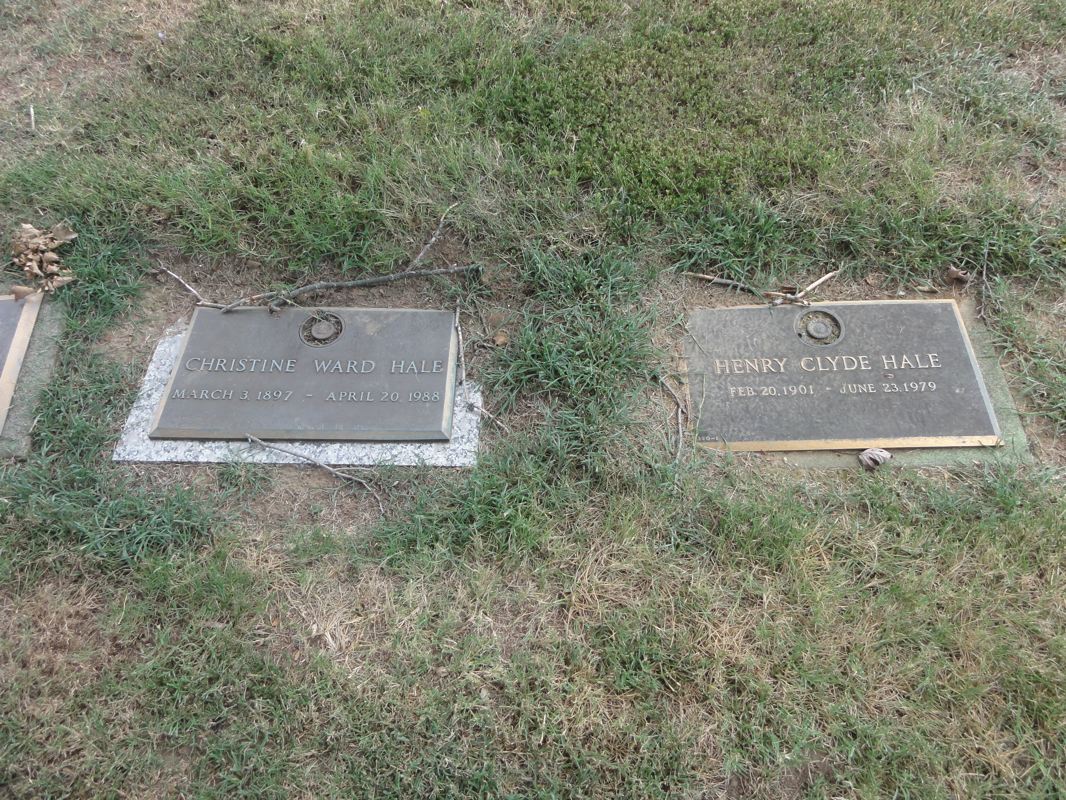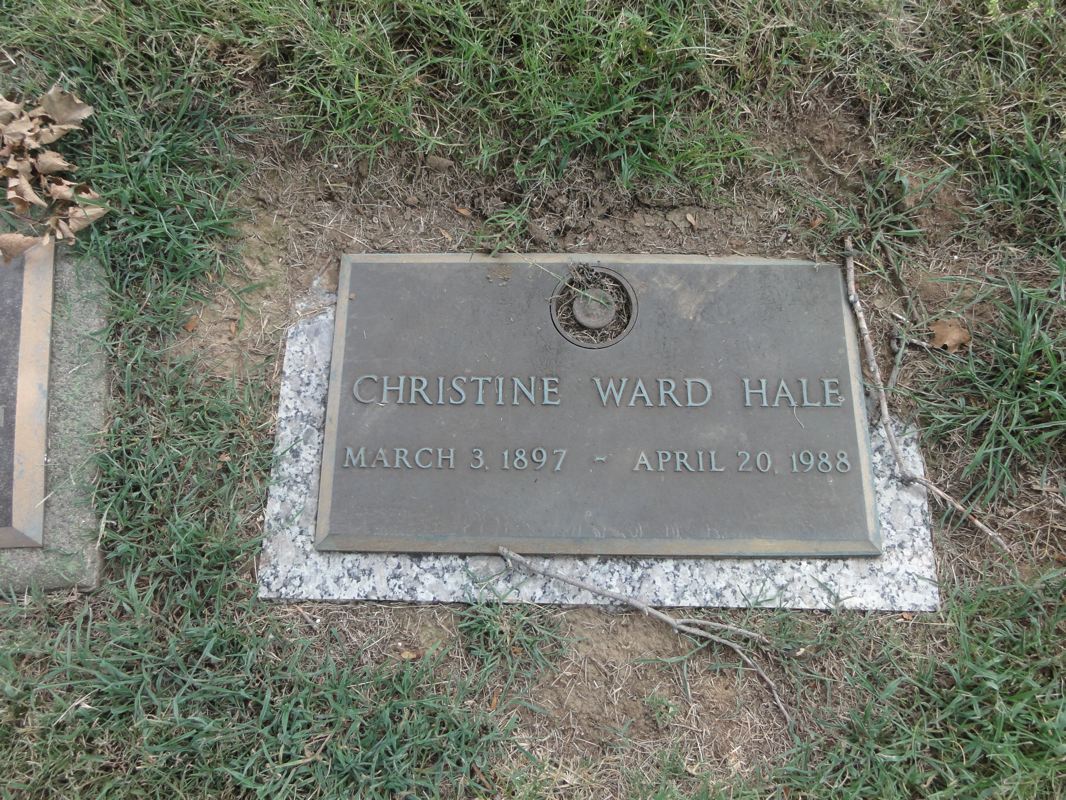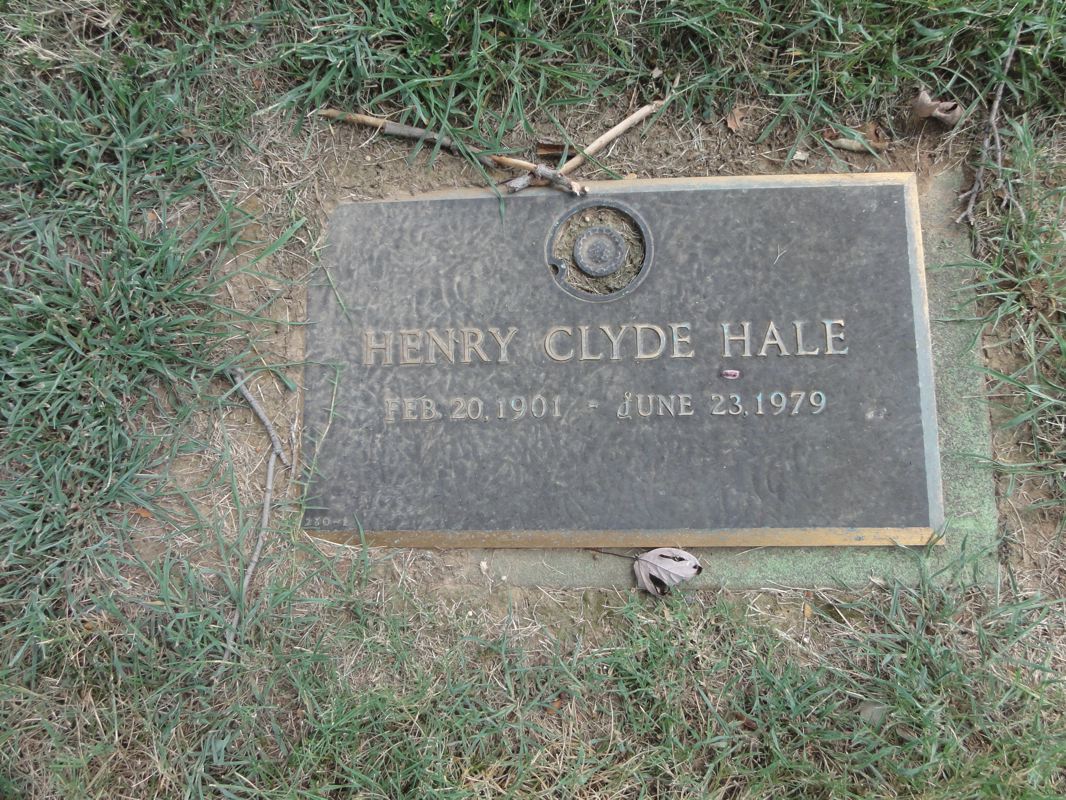Henry Clyde Hale
Feb. 20, 1901 - June 23, 1979
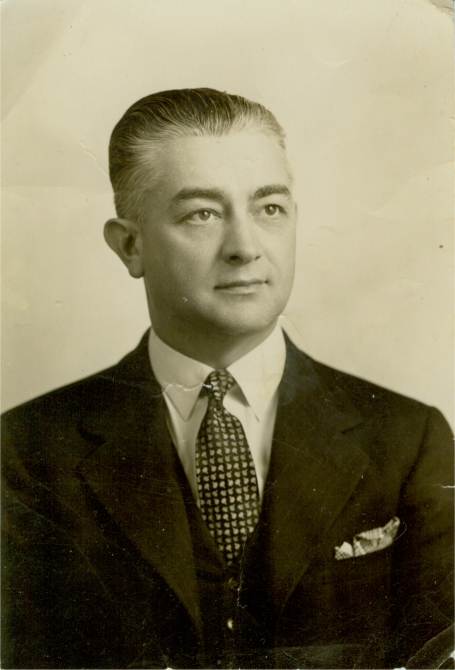
Biographical Sketch On The Life Of H. C. Hale
According to his birth certificate, Henry Clyde Hale, was born in Gassaway, Tennessee, near Woodbury, February 20, 1901, to George W. Hale and Nettie Kidwill Hale. There was a church of our Lord in Gassaway where he attended Sunday school and where his family worshipped. His mother had three uncles who were gospel preachers: J. M. Kidwill of Smithville, Wesley T. Kidwill, Dallas, Texas, and Thomas L. Kidwill of Cotton Mills. He remembered his mother holding in high esteem her uncles who preached the gospel of Christ, and she loved the time they would come to Gassaway and preach for the church and visit with the family.
When Clyde Hale was about thirteen, the family moved to McMinnville, Tennessee, where his father worked for the woolen mill at Faulkner Springs. They attended the Arlington Church of Christ, and it was known in the family as "Mother Hale's church." She loved her neighbors and friends, and according to those who remembered her, would often say after worship, "Come home with me for dinner."
As a child, he did not have much formal education.He remembered going for three or four years to a session of about five months in a "one room school house." His mother admonished him almost daily to read his Bible every day, pray daily, and to watch his company and seek out friends from "good" families.
About 1917, he went to Nashville and worked at the Grey and Dudley Hardware Co. where he made $40 a month and he lived at the YMCA.While there he met a good friend, Wendell Cook, who took him to his home congregation, the Russell Street Church of Christ, and introduced him to Bro. S. H. Hall.Bro. Hall baptized him into Christ, February 19,1922, and had him make a talk the next Wednesday evening.
It was soon time for the first Hardeman Tabernacle meeting at the Ryman Auditorium in Nashville, and Clyde Hale was there every service having been asked to serve as an usher. How the eloquence and the Scriptural reasoning of Bro. Hardeman must have stirred and inspired him!
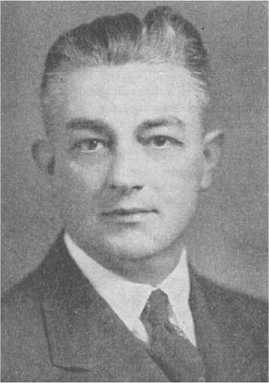 By now, he had determined to preach the
gospel and he knew that he needed a better education and more training. In September, 1922, at the age of 21, he entered high school at Freed Hardeman College in Henderson, Tennessee.After high school he entered David Lipscomb College, graduating in 1927. He had the opportunity to study under such capable men as N. B. Hardeman, A. G. Freed, and E. A. Elam. During the summer months he preached in Savannah, Georgia, and with his friend, J. Roy Vaughn in Mississippi. He was a special student at Emory University, 1931-1932. He also attended classes at Peabody College, and the University of Georgia.
By now, he had determined to preach the
gospel and he knew that he needed a better education and more training. In September, 1922, at the age of 21, he entered high school at Freed Hardeman College in Henderson, Tennessee.After high school he entered David Lipscomb College, graduating in 1927. He had the opportunity to study under such capable men as N. B. Hardeman, A. G. Freed, and E. A. Elam. During the summer months he preached in Savannah, Georgia, and with his friend, J. Roy Vaughn in Mississippi. He was a special student at Emory University, 1931-1932. He also attended classes at Peabody College, and the University of Georgia.
Again, his friend, Wendell Cook, was a blessing to him when he introduced him to his future wife, Christine Ward. She was the daughter of Dr. J. S. Ward, a medical doctor, having been a Science and Bible teacher at David Lipscomb College, and having served briefly on two occasions as its President.Dr. Ward preached on Sundays at various congregations in the middle Tennessee area. Clyde and Christine were married September 2, 1925, and lived in the Ward home on Caldwell Lane until he finished his degree from David Lipscomb College. He would later recall that while living in the Ward home, he was greatly impressed with the spirituality of Dr. Ward and his wife, "Miss Dottie." He once said that Dr. Ward was the most consecrated Christian man he had ever known, and he received as much spirituality from him as from any of his teachers.
He was preaching at the Donelson Church of Christ, when he was invited to move to the West End Church in Atlanta. S. H. Hall had worked at this church and was followed by B. C. Goodpasture. They moved to Atlanta October 1, 1927. At twenty-six he was in his prime and eagerly threw himself into doing all he could for the church in Atlanta and the cause in Georgia. While in Atlanta two children were born: Ann Dearing and Rosalyn Lee.
Clyde and Christine worked as a team and the church began to grow rapidly. Almost every evening cottage meetings were conducted in homes and hundreds were baptized as a result. According to Bro. Virgil Richie, "No sacrifice was ever too great, no time was ever too inconvenient, no distance was ever too far, for him to teach one about Christ and his church." It was also said by Bro. Richie that he was a "master at personal work and almost every week some would be baptized at the services" as a result of this personal work
A new brick building was erected on the corner of Gordon and Hopkins Street , the first service held on February 19, 1929. Bro. Hale's subject for the first sermon in the new building was "God's Pattern." The evening sermon was preached by Dr. Ward.
Clyde Hale conducted one of the earliest live radio programs in Georgia. He spoke over WAGA at 12:15 p.m. daily for ten years. Radio was a new medium and many were taught the truth and obeyed the gospel as a result of this work.
Not only was the church strengthened in Atlanta, but he helped establish churches in other places in Georgia.Tent meetings were conducted in the city and other parts of the state as far as Bogart, Bainbridge, Cordele, Valdosta, Winder, Athens, LaGrange, Macon, Pleasant Grove and elsewhere. In the late thirties, a tent meeting was held in the Northwest side of Atlanta and a congregation was established.
In 1930, he held a series of meetings in Marietta at Pleasant Grove and twenty-five were baptized.Later this became the Olive Street Church in Marietta, and is the Piedmont Road Church of today. In l934, he conducted a three week meeting in LaGrange and seventy-five people were baptized, and a new building was soon erected.
He also planted the Lord's church in the city of Athens during the l930's. His family was present the first Sunday that he preached there, meeting in the Court House. Tent meetings were held after that, and the church of our Lord came into being in Athens as a result of the preaching of Clyde Hale.
In 1931, one of his best efforts was to get Bro. Marshall Keeble to come to Atlanta and hold a tent meeting. At that time, there was not a single black member of the church in Atlanta. One hundred sixty-six were baptized during that three week meeting, and the Simpson Street Church of Christ came into being. Clyde Hale later wrote, "It was the most wonderful meeting I have ever witnessed. As many as 2,500 people came to hear Keeble and never was there less than one thousand."
Bro. Hale preached and strengthened many of the weak and struggling churches in Georgia. He preached for the Bremen Church many times. He preached for the church at Rockmart. They had been using an organ and he was able to get them to remove that. They had not been observing the Lord's Supper every first day and he taught them the truth more fully and they began observing it every Sunday. According to Ralph Henley, over one hundred were baptized in Rockmart.
Bro Henley claims that Bro. Hale conducted about one hundred meetings in Georgia. Many of these would be two or three week meetings. But there were also meetings in Florida, Alabama, Mississippi, and Tennessee during this time. His nephew, Billy Brewer, remembered going with him to a meeting in his old community of Gassaway. The meeting house was lighted with kerosene lamps, and the baptisms in the creek were some of the most beautiful memories one could have. Billy recalled that he had never heard a man preach as hard and as good "Uncle Clyde" did in Gassaway.
He had a men's training class at West End, and from that class there were eight men who made gospel preachers, including Charlie & Virgil Richie. At West End, he conducted one of the first vacation Bible schools among churches of Christ which lasted for three weeks.
When the Hales moved to Atlanta, the church at West End had about four hundred members. When they left there in 1943, it had a membership of eight hundred, by far the largest church of our Lord in Georgia, and perhaps one of the largest ones in the history of the state.
In 1972, he returned to Atlanta to hold a meeting at the Riverdale church and there were twelve responses, eight of them baptisms. According to Bro.Virgil Richie it was one of the best meetings in the history of that church.
His time and efforts in Georgia were probably the most productive of his life. In his heart he never really left Georgia, and like the song about Georgia he always had "Georgia On My Mind!" He would later refer to this time period as the "golden age of the church."
The Hales left Atlanta in 1943 for a short stay in Wichita Falls, Texas with the Tenth and Austin St. Church of Christ. His time was cut short there by a unique opportunity to come home to Nashville to the West End Church in 1944. The family can often recall in his prayers he would beseech the Lord to "chose our changes for us," and he made his decision on what he thought was best for his children to attend high school and college at David Lipscomb, for Christine to be near to care for her aging parents, and for the opportunity he felt it afforded him to be at the West End church with the great potential it had.
The West End
church was meeting in a substantial old brick home on West End Avenue
with a seating capacity of a hundred twenty-five. Soon an addition was added that would accommodate another
hundred. Then they went to two
services on Sunday morning because of their growth.In 1949 a very beautiful building was erected on the corner of Bowling
and West End Avenue that would seat approximately one thousand. The membership had grown to almost eight hundred. West End
became a very mission minded church, and this gave him the opportunity once
again to assist many churches in mission fields world wide. In 1952 he made an
extended tour of Europe and the Holy Land.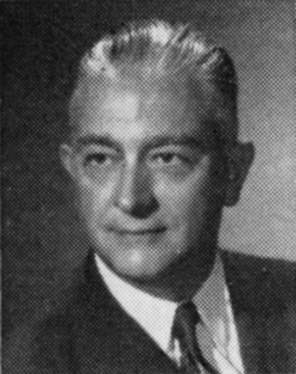
After fourteen years at West End in Nashville, he went to the University Church of Christ and worked hard to assist them with the Student Center work there, 1959. In time the congregation merged with the Waverly Belmont Church and became known as the Ashwood Church of Christ. There he continued to serve as an elder, teacher, and occasionally preaching until his death in 1979. During his years in Nashville he wrote articles for various journals including The Firm Foundation and Gospel Advocate.
In 1965, H. Clyde Hale, J. Roy Vaughn, and E. Ray Jerkins met to discuss the possibility of starting a training school for men desiring to preach who had jobs, families to support, and could not afford to attend any of our Christian colleges. This was the beginning of the Nashville School of Preaching. They took their plans to B. C. Goodpasture, and along with Charles Chumley, Roy Hearn, and Charles R. Brewer, the Nashville School of Preaching began.The teaching and the work with this school became one of the greatest joys and a highlight of Hale's latter years. He often said that if the church was to be saved from the liberalism that was creeping in it would be from men trained at the Nashville School of Preaching and similar schools.
From this school many sound gospel preachers have filled the pulpits and Bible classes in the middle Tennessee area and elsewhere. He loved these men that he taught, and he was known among the students as one like John, the apostle of love. But also like John, he could be a "son of thunder."
He was a "man of God." He loved the individual and had great patience with human frailties. He never lost his touch for the common man. It was not uncommon for the tears to flow down his cheeks as he preached, and as he talked with men. Dr. John Cayce, an elder at West End in Nashville, once commented that he had never known anyone who had the ability to change the conduct and convert men as men and to make men into what God would have them be as men as did Bro. Hale.
He recalled to his family the events of the last evening he spent as a student at David Lipscomb College when he met in Lindsley Hall with six other men who planned to be preachers.This was their last time to be together and they had a prayer meeting, and the gist of their prayer was this: "that God would bless them, not to be great and not to be big, but to be useful."
This was always his ambition in his own words, "to be useful, to be sound in the faith, and to carry forward the blood stained banner of Prince Immanuel, to be careful about the things of the Lord, and to seek first His kingdom and His righteousness."
He is remembered for his love of his family, his great love of preaching, a man of the Book, who loved all men and wanted all to know the salvation in Jesus Christ.
Webmaster's Note: I feel a special connection to Bro. Hale, having grown up in Atlanta, and now preaching for the Buford congregation. In many respects, the work of H.C. Hale has made it possible for the work in Buford, and many of the other churches now existing in Atlanta. Virgil Richie was a great mentor to me growing up, having preached at Riverdale when I was a young song leader, and an elder when I preached at Fayetteville. Also, I was honored to have preached his funeral when he passed.
![]()
Directions To The Grave Of Clyde Hale
Directions: Woodlawn Cemetery, Nashville, Tennessee, is located behind the 100 Oaks Shopping Center that faces I-65 just south of the I-440 Interchange. From 100 Oaks travel east on Thompson Lane and turn right at the first entrance to Woodlawn's South Side Park (across from main part of cemetery). Take the first left and road bears around to the right. Look for the tree on the right had side. Between the drive and the tree is Goodpasture's grave. Just past Goodpasture, nearer the tree is the Ward plot where Hale and his wife are buried.
GPS Location
36°06'39.7"N 86°45'37.2"W
or D.d. 36.111023, -86.760338
![]()
The Hales are buried in the J.S. Ward Family Plot
Christine Ward Hale
March 3, 1897 - April 20, 1988
Henry Clyde Hale
February 20, 1901 - June 23, 1979
![]()
A special thanks is extended to Rosalyn Hale Boyd, daughter of Clyde and Christine Ward Hale. Roselyn is also the wife of Jim Boyd, long-time gospel preacher. Roselyn provided much of the information above that she gleaned from writing by Ralph Henley, and tape recordings of Billy Brewer and Ralph Henley given at an appreciation dinner in honor of the Hales, the taped funeral address by Virgil Richie, and a private tape made by Clyde Hale for his family. Some dates were added that were gleaned from an article in the Gospel Advocate April 24, 1941, page 387, with the picture above. Additional information came from Preachers Of Today, Vol. I, II, and III. ed. Baxter and Young, Gospel Advocate Co.
![]()
